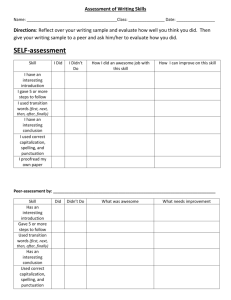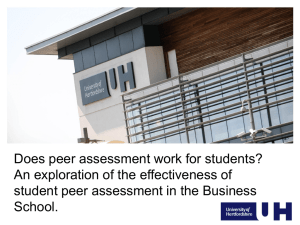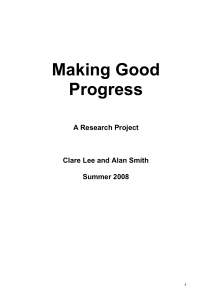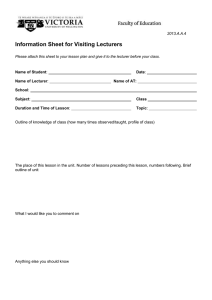Paper Title (use style: paper title)
advertisement
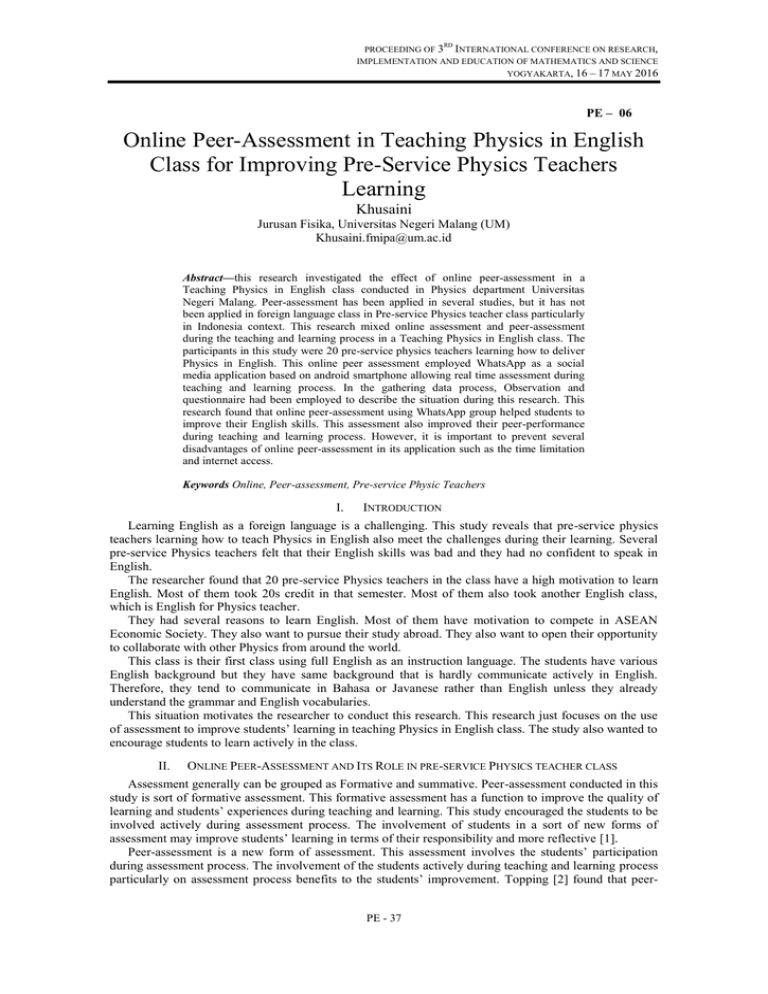
RD PROCEEDING OF 3 INTERNATIONAL CONFERENCE ON RESEARCH, IMPLEMENTATION AND EDUCATION OF MATHEMATICS AND SCIENCE YOGYAKARTA, 16 – 17 MAY 2016 PE – 06 Online Peer-Assessment in Teaching Physics in English Class for Improving Pre-Service Physics Teachers Learning Khusaini Jurusan Fisika, Universitas Negeri Malang (UM) Khusaini.fmipa@um.ac.id Abstract—this research investigated the effect of online peer-assessment in a Teaching Physics in English class conducted in Physics department Universitas Negeri Malang. Peer-assessment has been applied in several studies, but it has not been applied in foreign language class in Pre-service Physics teacher class particularly in Indonesia context. This research mixed online assessment and peer-assessment during the teaching and learning process in a Teaching Physics in English class. The participants in this study were 20 pre-service physics teachers learning how to deliver Physics in English. This online peer assessment employed WhatsApp as a social media application based on android smartphone allowing real time assessment during teaching and learning process. In the gathering data process, Observation and questionnaire had been employed to describe the situation during this research. This research found that online peer-assessment using WhatsApp group helped students to improve their English skills. This assessment also improved their peer-performance during teaching and learning process. However, it is important to prevent several disadvantages of online peer-assessment in its application such as the time limitation and internet access. Keywords Online, Peer-assessment, Pre-service Physic Teachers I. INTRODUCTION Learning English as a foreign language is a challenging. This study reveals that pre-service physics teachers learning how to teach Physics in English also meet the challenges during their learning. Several pre-service Physics teachers felt that their English skills was bad and they had no confident to speak in English. The researcher found that 20 pre-service Physics teachers in the class have a high motivation to learn English. Most of them took 20s credit in that semester. Most of them also took another English class, which is English for Physics teacher. They had several reasons to learn English. Most of them have motivation to compete in ASEAN Economic Society. They also want to pursue their study abroad. They also want to open their opportunity to collaborate with other Physics from around the world. This class is their first class using full English as an instruction language. The students have various English background but they have same background that is hardly communicate actively in English. Therefore, they tend to communicate in Bahasa or Javanese rather than English unless they already understand the grammar and English vocabularies. This situation motivates the researcher to conduct this research. This research just focuses on the use of assessment to improve students’ learning in teaching Physics in English class. The study also wanted to encourage students to learn actively in the class. II. ONLINE PEER-ASSESSMENT AND ITS ROLE IN PRE-SERVICE PHYSICS TEACHER CLASS Assessment generally can be grouped as Formative and summative. Peer-assessment conducted in this study is sort of formative assessment. This formative assessment has a function to improve the quality of learning and students’ experiences during teaching and learning. This study encouraged the students to be involved actively during assessment process. The involvement of students in a sort of new forms of assessment may improve students’ learning in terms of their responsibility and more reflective [1]. Peer-assessment is a new form of assessment. This assessment involves the students’ participation during assessment process. The involvement of the students actively during teaching and learning process particularly on assessment process benefits to the students’ improvement. Topping [2] found that peerPE - 37 ISBN. 978-602-74529-0-9 assessment gave positive effects on students’ achievement and attitude as good as effect of lecturer assessment. Online peer-assessment is a kind of assessment assisted by the advance of Information and Communication Technology (ICT). The use of ICT in the class may reveal positive effect in students’ learning. Wenna and Tsai [3] found that the use of online peer-assessment could improve the project and feedback quality of in-service science and mathematics teachers. However, they also found that there was the decrease of teachers’ attitude toward online peer-assessment after the period of its application. The main component of online peer-assessment is how to keep high quality feedback. The feedback enhances the quality of peer-assessment to improve students’ learning. Liu and Charles [4] argue that high quality feedback should be kept to encourage students’ provide feedback objectively. They found that grader may influence the quality of feedback. Therefore, this research just gave the students to assess their peer performance and gave comment on each online peer assessment. This study investigates the application of online peer-assessment in a Teaching Physics in English class. This study is a preliminary study to the deeper research regarding the use of ICT in peerassessment. This study may describe the benefits and the weaknesses of online peer-assessment. The author or Physics educators may benefit to consider the use of online peer assessment in different Physics classes. III. METHODS AND DESIGN This research employed qualitative approach during the data collection. The advantages of qualitative research are the number of participant, the deep description of the findings, and high quality data provided by the research. The author is the lecturer in the Teaching Physics in English class at Physics department Universitas Negeri Malang. Therefore, the researcher knows the real situation and students’ background involved in this research. The researcher also analysed the pre research situation before the application online peerassessment. In this study, the author conducted research alone. Methods employed in this research were observation, questionnaire and interview. The researcher observed the students’ activities during the class particularly before and after the application online peer assessment. Field note was written to describe the real condition in the class. Furthermore, the lecturer also use online questionnaire to gather students’ opinion during and after the implementation of online peer-assessment. This questionnaire was made on open ended form to gather various views of the students. Moreover, interview was conducted to collect direct and spotaneous data from the participants. 20 pre-service physics teachers, which are the students at Physics department Universitas Negeri Malang, have been selected in this study. They are the 3rd year student in pre-service Physics teacher program. They took the course as an elective course to enrich their teaching and learning schools before conducting research and teaching experiences in the real schools. The course could be said as the last course class to prepare students in their future teaching and learning life. WhatsApp has been chosen to be studied in this study because the vast majority of pre-service Physics teachers studying in Physics department Universitas negeri Malang use this application in their daily activities. They also tend to communicate with their lectures particularly the author with this android program. The Physics department Universitas Negeri Malang also communicates the new information and policies through WhatsApp. Before the research has been conducted, the class leader invited the researcher to join the class group discussion on WhatApps. The advantages of the program are the capability to communicate in limited internet connection, the easy access, and the opportunity to display the students’ peer-assessment to their friends. A rubric for online peer-assessment has been provided by discussing the whole Teaching Physics in English lecturers. This discussion enriches the final rubric and can be used in different class. The rubric was designed in a simple way to help the students to learn and use. The rubric can be seen in Table 1 below. The rubric was introduced to the students before the use. They could ask and discuss how to use the rubric. The research also introduced how to assess their peer-presentation. The students just need to post with provided format. The format is just typing the presenter’s name, the assessor’s name, categories values, and their comment. The example of the format is Oci #Sandy# Good# Fair # Less# Ochi can explain correctly, but she has fair communication skills, and less interaction with audiences. The students just need to post their marking in WhatsApp class group. PE - 38 RD PROCEEDING OF 3 INTERNATIONAL CONFERENCE ON RESEARCH, IMPLEMENTATION AND EDUCATION OF MATHEMATICS AND SCIENCE YOGYAKARTA, 16 – 17 MAY 2016 TABLE 1 RUBRIC FOR PRESENTATION ON TEACHING PHYSICS IN ENGLISH Criteria Content (30%) Communication Clarity (30%) Interaction with the audience (40%) Less Less comprehensive or having misconception Unclear Pronounciation and intonation Using less appropriate word choices Less keeping eye contact Less encouraging audience participation Fair Quite comprehensive and no misconception Quite good Pronounciation and intonation Using several appropriate word choices Several keeping eye contact Several encouraging audience participation Good Comprehensive and No Misconception Quite good Pronounciation and intonation Using several appropriate word choices Most keeping eye contact Most encouraging audience participation The whole students could see the result of online peer-assessment. The example of students’ peer assessment can be seen in Figure 1. FIGURE 1 STUDENTS’ ONLINE PEER-ASSESSMENT IV. FINDINGS During the teaching and learning in the class, questionnaire has been administered to gather participants’ opinion for online peer-assessment. Three questions have been asked to the students. The questions are listed below. Does online peer-assessment help you to learn from your friends? Are you interested in peer assessment to be implemented in the course? What do you think about your friends' comment? Participant responds can be seen on Table 2 below. TABLE 2. STUDENTS RESPONDS REGARDING THE APPLICATION OF ONLINE PEER-ASSESSMENT NO 1 2 3 4 5 6 7 8 9 10 Students’ Responds Yes. Yes. I think the comment has subjectivity aspect I mean laziness n sleepiness influence the comment Yes. Interested. It is so helpful. Yes i do. Because there are is one sample for assessment. 3. They comment to build and adding experience Yes, because from this assessment we can know what our weakness. Yes, because from this assessment we can know our weakness. Yes I do, peer assessment have trained our skill to assess friends. The friends comment is good for our improvements and I think a several friends comment with the funniest statement. I like that. es, I'm interested in peer assessment to be implemented in this course. I think about my friend's comment is most of objective and should be honest so we can learn from our comment and we can improve our skill about English, Yes. Because this peer assessment improve my skill although I feel under pressure before TPE class because my English skill is bad 1. Yes, 2. I'm interested in peer assessment to be implemented in this course. 3. i think about my friend's comment is most of subjective and should be honest so we can learn from our comment and we can improve our skill about English. Yes. Many suggest from friends can build my spirit and improve my skill es. ecause, from the comments of my friends I hope i can do more better next time PE - 39 ISBN. 978-602-74529-0-9 11 12 13 14 15 16 Yes, I do. Yes, very interested. I think it so fun, because we can to know learn as a commentator , so it can build adding in our experience, and we can more improve our skill again Yes, because it can give me a motivation to improve my skill. Yes. Because, by assessing my friends, directly I must attentive and understand what's my friends' explain. Yes, because I can get feedback directly es sir, i think about my friends comment can improve my skill and do be better before Yes, I do, sir. by assess friends, it make us: understand the content, know where we must improve for next our performance.. it will be better continue this way, sir.. The study found that students have many different marking scores only on the first online peerassessment. Only two students had similar marking score with the lecturer. After the lecturer gave feedback for marking score and the student’s performance, there were improvements of the similar perception between the students and the lecturer in terms on marking score for student’s performance. Students’ performance has improved on assessment skills, English skills and presentation skills during online peer-assessment. The students participated on the study had more intention during the application of online peer-assessment. They also tried to use the rubric to assess their peer performance. Compared to the situation before the application of online peer-assessment, the students felt sleepy and lazy because the class was held from 03.00 pm to 5.30 pm. It means that the students already felt tired because of other classes and activities. The students, who are both presenter and assessor, received and thought about the assessed performance based on peer-feedbacks and lecture’s feedback. It can be concluded that the whole class would learn each other. The results of this learning situation can be seen from the improvement of the students’ performance during presentation assignment. V. DISCUSSION Based on the research findings, there are several factors need to be consider before the use of online peer-assessment. First, the lecturer should introduce the rubric and its use during assessment process. The rubric has several advantages i.e. improving student’s performance during assessment and doing the assignment. Second, the lecturer should provide feedback during teaching and learning process. The feedback will improve and enhance students’ skills and improve the learning process. Third, the lecturer should help the students to learn how to analyse and assess their peer-performance. It is important to learn how to assess other performance particularly for common performance. The students tend to assess differently when the performance of their friends was in common performance. The lecturer should also train the students to assess objectively without friendship consideration. The fourth, the lecturer should consider the internet connection and students’ familiarity with the particular software. These factors may influence the success of the research on online peer-assessment. VI. CONCLUSION It can be concluded that online peer-assessment has several benefits. Students could enhance their learning process in the Teaching Physics in English class. Students can improve their English skills and presentation skills using provided feedbacks. Furthermore, students marking score had nearly similar score the lecturer’s assessment. The preparation about rubric and internet connection should be considered before applying online peer-assessment. Feedback should be kept objectively to enhance students’ learning process. REFERENCES [1] [2] [3] [4] Dochy,F. Segers,M. Sluijsmans, D “The use of Self-,peer, and Co-Assessment in HIgher Education: a Review” in Studies in Higher Education vol. 24 no. 3 pp. 331-350, 1999 Topping, Keith “Peer Assessment between students in Colleges and Universities” in Review of Educational research vol.68 no.3, pp. 249-276 , 1999 Meichun Lydia Wena and Chin-Chung Tsaib “Online peer assessment in an inservice science and mathematics teacher education course” in Teaching in Higher Education vol.13 no.1 pp. 55-67, 2008. Liu, Ngar-Fun& Carless, David “Peer feedback: the learning element of peer assessment” in Teaching in Higher education vol. 11 no. 3 pp. 279-290, 2006. PE - 40
